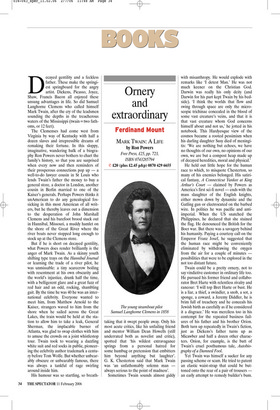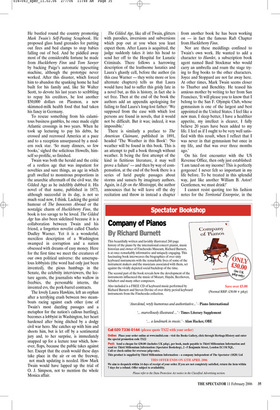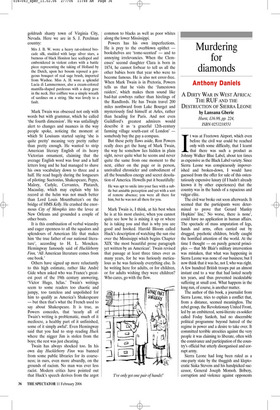D ecayed gentility and a feckless father. These make the springiest
springboard for the angry artist. Dickens, Picasso, Joyce, Shaw, Francis Bacon all enjoyed these unsung advantages in life. So did Samuel Langhorne Clemens who called himself Mark Twain, after the cry of the leadsmen sounding the depths in the treacherous waters of the Mississippi (twain=two fathoms, or 12 feet).
The Clemenses had come west from Virginia by way of Kentucky with half a dozen slaves and irrepressible dreams of remaking their fortune. In this sloppy, imaginative, wandering hulk of a biography Ron Powers never bothers to chart the family’s history, so that you are surprised when every now and then reminders of their prosperous connections pop up — a well-to-do lawyer cousin in St Louis who lends Twain’s father the money to buy a general store, a doctor in London, another cousin in Berlin married to one of the Kaiser’s generals. Perhaps Powers thinks it unAmerican to do any genealogical fossicking in this most American of all writers, but he thereby leaves out a dimension to the desperation of John Marshall Clemens and his barefoot brood stuck out in Hannibal, Missouri, a muddy hamlet on the shore of the Great River where the river boats never stopped long enough to stock up at the Clemens store.
But if he is short on decayed gentility, what Powers does render brilliantly is the anger of Mark Twain. As a skinny youth shifting type trays on the Hannibal Journal or learning the trade of a river pilot, he was unmissable: a tiny scarecrow boiling with resentment at his own obscurity and the world’s injustice, drunk half the time, with a belligerent glare and a great fuzz of red hair and an odd, rocking, shambling gait. By the time he was 40 he was an international celebrity. Everyone wanted to meet him, from Matthew Arnold to the Kaiser, strangers waved to him from the shore when he sailed across the Great Lakes, the train would be held at the station to allow him to take a leak, General Sherman, the implacable burner of Atlanta, was glad to swap clothes with him to amuse the crowds on a joint whistlestop tour. Twain took to wearing a dazzling white suit and red socks in public, pioneering the celebrity author trademark a century before Tom Wolfe. But whether unbearably obscure or unbearably famous, there was always a tankful of rage swirling around inside him.
His humour was so startling, so breath taking that it swept people away. Only his most acute critics, like his unfailing friend and mentor William Dean Howells (still underrated both as novelist and critic), spotted that ‘his wildest extravagance springs from a personal hatred for some humbug or pretension that embitters him beyond anything but laughter’. G. K. Chesterton said that Mark Twain was ‘an unfathomably solemn man always serious to the point of madness’.
Sometimes Twain sounds almost giddy with misanthropy. He would explode with remarks like ‘I detest Man.’ He was not much keener on the Christian God. Darwin was really his only deity (and Darwin for his part kept Twain by his bedside). ‘I think the worlds that flow and swing through space are only the microscopic trichinae concealed in the blood of some vast creature’s veins, and that it is that vast creature whom God concerns himself about and not us,’ he jotted in his notebook. This Hardyesque view of the cosmos became a rooted pessimism when his darling daughter Susy died of meningitis: ‘We are nothing but echoes, we have no thoughts of our own, no opinions of our own, we are but a compost heap made up of decayed heredities, moral and physical.’ He held out little hope for the human race to which, to misquote Chesterton, so many of his enemies belonged. His satirical fantasy, A Connecticut Yankee at King Arthur’s Court — claimed by Powers as America’s first sci-fi novel — ends with the mass slaughter of the English knights, either mown down by dynamite and the Gatling gun or electrocuted on the barbed wire. In politics he was pacific and antiimperial. When the US snatched the Philippines, he declared that she stained the flag. He denounced the British for the Boer war. But there was a savagery behind his humanity. Paying a courtesy call on the Emperor Franz Josef, he suggested that the human race might be conveniently eliminated by withdrawing the oxygen from the air for a couple of minutes possibilities that were to be explored in the not too distant future.
Twain could be a pretty ornery, not to say vindictive customer in ordinary life too. He pursued his former friend and collaborator Bret Harte with relentless rivalry and rancour: ‘I will top Bret Harte or bust. He is a liar, a thief, a swindler, a snob, a sot, a sponge, a coward, a Jeremy Diddler, he is brim full of treachery and he conceals his Jewish birth as carefully as if he considered it a disgrace.’ He was merciless too in his contempt for the repeated business failures of his father and his brother Orion. Both turn up repeatedly in Twain’s fiction, just as Dickens’s father turns up as Micawber and half a dozen other characters. Orion, for example, is the butt of Twain’s cruel posthumous tale, Autobiography of a Damned Fool.
Yet Twain was himself a sucker for any passing scheme or scam. He tried to patent an elastic waist-strap that could be buttoned onto the rear of a pair of trousers an early attempt to remedy builder’s bum. He bustled round the country promoting Mark Twain’s Self-Pasting Scrapbook. He proposed glass hand grenades for putting out fires and bed clamps to stop babies falling out of bed. And he piddled away most of the considerable fortune he made from Huckleberry Finn and Tom Sawyer by backing Paige’s automatic typesetting machine, although the prototype never worked. After this disaster, which forced him to abandon the spanking home he had built for his family and, like Sir Walter Scott, to devote his last years to scribbling to repay his creditors, he lost another $50,000 dollars on Plasmon, a new skimmed-milk health food that had taken his fancy in Germany.
To rescue something from his calamitous business gambles, he once made eight Atlantic crossings in two years. When he took up lecturing to pay his debts, he crossed and recrossed America at a pace and to a reception unsurpassed by a modern rock star. ‘So many dinners, so few books,’ sighed the solicitous Howells, himself so prolific, so finished.
Twain was both the herald and the critic of a restless age that was impatient for novelties and sure things, an age in which graft swelled to monstrous proportions in the anarchic aftermath of the civil war, the Gilded Age as he indelibly dubbed it. His novel of that name, published in 1873, although successful in its day, is not so much read now, I think. Lacking the genial humour of The Innocents Abroad or the nostalgic charm of Huckleberry Finn, the book is too savage to be loved. The Gilded Age has also been sidelined because it is a collaboration between Twain and his friend, a forgotten novelist called Charles Dudley Warner. Yet it is a wonderful, merciless description of a Washington swamped in corruption and a nation obsessed with dreams of easy money. Here for the first time we meet the creatures of our own political universe: the unscrupulous lobbyists (the word had only just been invented), the pious humbugs in the Senate, the celebrity interviewers, the lecture agents, the journalists who wallow in freebies, the personable interns, the invented cvs, the pork-barrel contracts.
The lovely Laura Hawkins, left an orphan after a terrifying crash between two steamboats racing against each other (one of Twain’s most dazzling passages and a metaphor for the nation’s callous hurtling), becomes a lobbyist in Washington, her heart hardened after being ditched by a dodgy civil war hero. She catches up with him and shoots him, but is let off by a sentimental jury and, to her surprise, is immediately snapped up for a lecture tour which, however, flops, because the public takes against her. Except that the crash would these days take place in the air or on the freeway, not much updating is needed. How Mark Twain would have lapped up the trial of O. J. Simpson, not to mention the whole Monica affair. The Gilded Age, like all of Twain, glitters with parodies, inversions and subversions which pop out at you when you least expect them. After Laura is acquitted, the judge suddenly takes it into his head to send her off to the Hospital for Lunatic Criminals. There follows a harrowing description of the loathsome lunatics and Laura’s ghastly cell, before the author (in this case Warner — they write more or less alternate chapters) tells us that Laura would have had to suffer this grisly fate in a novel but, as this is history, in fact she is set free. Then at the end of the book the authors add an appendix apologising for failing to find Laura’s long-lost father: ‘We supposed from the ease with which lost persons are found in novels, that it would not be difficult. But it was; indeed, it was impossible.’ There is similarly a preface to The American Claimant, published in 1891, headed ‘The Weather in this Book’: ‘No weather will be found in this book. This is an attempt to pull a book through without weather. It being the first attempt of the kind in fictitious literature, it may well prove a failure’ — and then by way of compensation, at the end of the book there is a series of lurid purple passages about storms and sunsets by imaginary authors. Again, in Life on the Mississippi, the author announces that he will leave off the dry recitation and throw in instead a chapter from another book he has been working on — in fact the famous Raft Chapter from Huckleberry Finn.
Nor are these meddlings confined to Twain’s own work. He wanted to add a character to Hamlet, a subscription book agent named Basil Stockmar who would carry an umbrella and roam the stage trying to flog books to the other characters. Joyce and Stoppard are not far away here. At other times, Mark Twain seems closer to Thurber and Benchley. He teased his anxious mother by writing to her from San Francisco, ‘It will please you to know that I belong to the San F. Olympic Club, whose gymnasium is one of the largest and best appointed in the United States. I feel like a new man. I sleep better, I have a healthier appetite, my intellect is clearer, I fully believe 20 years have been added to my life. I feel as if I ought to be very well satisfied with this result, when I reflect that I was never in that gymnasium but once in my life, and that was over three months ago.’ On his first encounter with the US Revenue Office, then only just established: ‘I am taxed on my income! This is perfectly gorgeous! I never felt so important in my life before. To be treated in this splendid way, just like another William B. Astor! Gentlemen, we must drink!’ I cannot resist quoting too his fashion notes for the Territorial Enterprise, in the goldrush shanty town of Virginia City, Nevada. Here we are in S. J. Perelman country:
Mrs J. B. W. wore a heavy rat-colored brocade silk, studded with large silver stars, a burnous of black Honiton lace scalloped and embroidered in violent colors with a battle piece representing the taking of Holland by the Dutch, upon her bosom reposed a gorgeous bouquet of real sage brush, imported from Washoe. Miss A. H. wore a splendid Lucia di Lammermoor, also a cream-colored mantilla-shaped pardessus with a deep gore in the neck. Her coiffure was a simple wreath of sardines on a string. She was lovely to a fault.
Mark Twain was obsessed not only with words but with grammar, which he called ‘the fourth dimension’. He was unfailingly alert to changes and nuances in the way people spoke, noticing the moment at which St Louisans started saying ‘she is quite pretty’ meaning very pretty rather than pretty enough. He wanted to strip American literary English of its heavy Victorian ornament, claiming that the average English word was four and a half letters long and he had managed to shave his own vocabulary down to three and a half. He read hugely during the longueurs of piloting: Suetonius, Shakespeare, Pepys, Malory, Carlyle, Cervantes, Plutarch, Macaulay, which may explain why his record at the helm was not much better than Lord Louis Mountbatten’s on the bridge of HMS Kelly. He crashed the enormous City of Memphis into the levee at New Orleans and grounded a couple of other boats.
It is this combination of verbal wizardry and eager openness to all the squalors and splendours of American life that makes him ‘the true father of our national literature’, according to H. L. Mencken. Hemingway famously said of Huckleberry Finn, ‘All American literature comes from one book.’ Others have signed up more reluctantly to this high estimate, rather like André Gide when asked who was France’s greatest poet of the 19th century answering, ‘Victor Hugo, hélas.’ Twain’s writings seem to some readers too chaotic and jumpy, too tasteless and unpolished for him to qualify as America’s Shakespeare — but then that’s what the French used to say about Shakespeare. It is true, as Powers concedes, that ‘nearly all of Twain’s writing is problematic, much of it mediocre, a healthy part of it unfinished, some of it simply awful’. Even Hemingway said that you had to stop reading Huck where the nigger Jim is stolen from the boys; the rest was just cheating.
Twain has always shocked too. In his own day Huckleberry Finn was banned from some public libraries for its coarseness; in ours, even more absurdly, on the grounds of racism. No man was ever less racist. Modern critics have pointed out that Huck’s speech derives from the argot common to blacks as well as poor whites along the lower Mississippi.
Powers has his own imperfections. He is prey to the overblown epithet bookshelves are ‘tome-scented’ — and to annoying irrelevancies. When the Clemenses’ second daughter Clara is born in 1874, he cannot forbear to tell us all the other babies born that year who were to become famous. He is also not error-free. When Mark Twain is in Pretoria, Powers tells us that he visits the ‘Jamestown raiders’, which makes them sound like bad-hat cowboys rather than hirelings of the Randlords. He has Twain travel 200 miles northward from Lake Bourget and mysteriously find himself at Arles, rather than heading for Paris. And not even Guildford’s greatest admirers would describe it as ‘a graceful 12th-century farming village south-east of London’ somebody buy the guy a compass.
But these petty flaws aside, Ron Powers really does get the hang of Mark Twain, the way he somehow lies hidden in plain sight, never quite what he seems and never quite the same from one moment to the next, either on the page or in person, unrivalled chronicler and embodiment of all the boundless energy and secret desolation of America. Howells put it beautifully:
He was apt to smile into your face with a subtle but amiable perception and yet with a sort of remote absence; you were all there for him, but he was not all there for you.
Mark Twain is, I think, at his best when he is at his most elusive, when you cannot quite see how he is mixing it up or where he is taking you and that is why you are good and hooked. Harold Bloom called Huck’s description of watching the sun rise over the Mississippi which begins Chapter XIX ‘the most beautiful prose paragraph yet written by an American’. Twain revised that passage at least three times over as many years, for he was furiously meticulous as he was furiously everything else. Is he writing here for adults, or for children, or for adults wishing they were children? Who cares, go with the flow.
















































 Previous page
Previous page